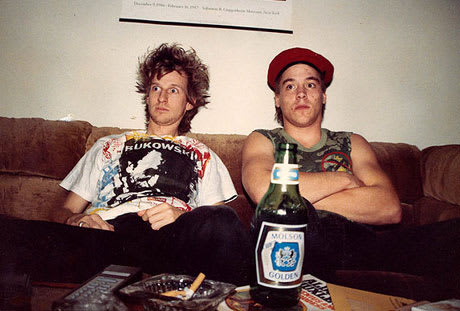Two old men getting drunk and violently screaming at each other in a ramshackle apartment – to most of us, this sounds like a lawsuit and a broken hip waiting to happen. But to Eddie Lee Sausage and Mitchell D, two punks fresh out of college who moved next door in 1987, it was the best entertainment money couldn't buy. When the friends began recording the epic arguments between Peter Haskett and Raymond Huffman, with a resounding "Shut up, Little Man!" as the pièce de resistance to each fight, via mics affixed to ski poles hovering outside the men's window, a small piece of pop culture history was made – they just didn't know it yet. In the documentary Shut Up Little Man!, director Matthew Bate tells a story of greed, exploitation and friendship almost inexplicably linked to a pre-Internet viral sensation. From the onset, you can scarcely believe this twisted version of Grumpy Old Men. Neither could Eddie and Mitchell, who recorded over 14 hours of the expletive-filled, oft-homophobic tirades of their neighbours. The recordings, which started off as insurance in case anything terrible happened to either party, became an art form called audio verité – real audio recorded without a subject's awareness. (In the DVD extras, which include extended interviews and deleted scenes, outtakes of a grizzled Orson Welles recording radio ads are provided as a telling example of audio verité.) Soon, the boys were distributing cassette tapes of Peter and Raymond's antics to their friends, who would then share the recordings with their circles. Before long, magazines were turning the duo into comic book characters, a play was written, a CD was released and three separate film projects were in the works. It's hardly surprising when the issue of copyright comes up (after all, can you copyright material that is recorded surreptitiously?) and later, in the real turning point to Bate's Shut Up Little Man!, the two men's rights to the content. The reality of elderly alcoholics arguing with each other in a low-income housing complex quickly loses its comedic appeal, and the motives of Eddie and Mitchell, not to mention the number of other people profiting from merch sales, are thrown into question. Bate's curio of a documentary, which initially seemed to be a fan boy's homage to college humour, gradually sheds excellent insight into the fine line between art (Eddie continues to sell Peter and Raymond's fake death certificates to fans) and unfettered exploitation. Bate expertly tells his story, only making his presence known towards the end, while raising questions about who really profits from a cult classic.
(Mongrel Media)Shut Up Little Man!
Matthew Bate

BY Manori RavindranPublished Feb 3, 2012